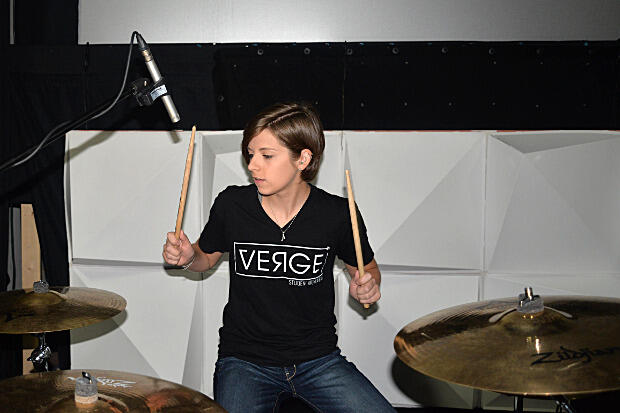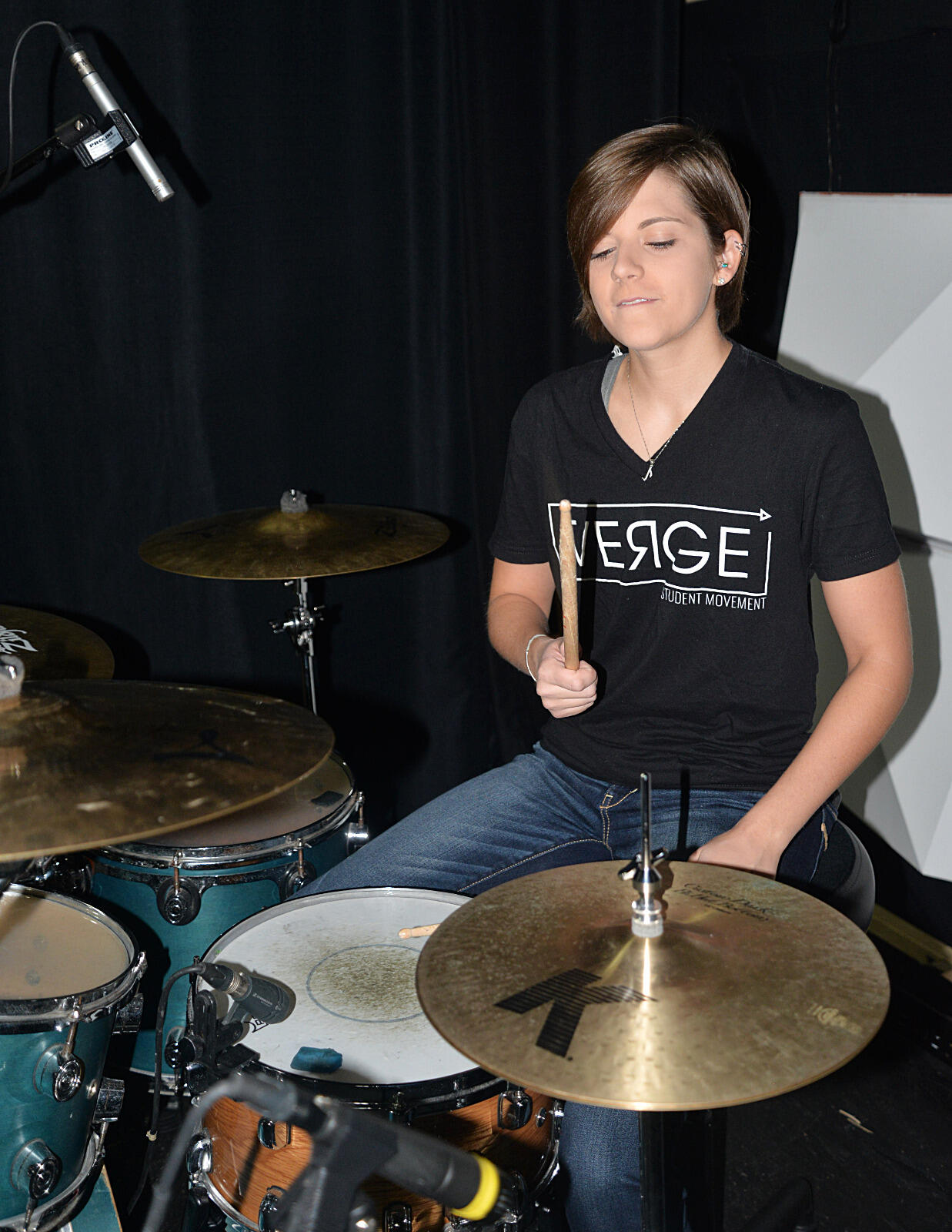
<br>Photos by Leha Byrd, University Public Affairs
Oct. 21, 2016
Patient is ready to hear ‘in stereo’ and help others with hearing loss
Share this story
The national story of a deaf teenager who had his belongings, including a backup battery for a cochlear implant, thrown into a toilet sparked outrage across the country. Many people rallied behind Alex Hernandez by replacing his belongings and creating a GoFundMe Page for him. Rebecca Balint saw the story and felt an instant connection with Hernandez.
“When my sister and I saw that post it sent immediate tears to my eyes and made my heart feel as if I plummeted a thousand floors,” she said. “It gave me flashbacks to the days I was bullied because of my disability.”
Like Hernandez, Balint is hearing impaired. Since she was 4, the Chester resident has struggled with progressive hearing loss and has been a patient at the VCU Health Department of Audiology most of her life. As an adolescent she wore bilateral hearing aids, but a year ago began wearing a single cochlear implant, an electronic medical device that serves the function of the damaged inner ear. It worked so well that Balint received a second cochlear implant in September.
“I have to be honest I was terrified to get cochlear implants, but ever since getting them it's been the best decision of my life,” Balint said. “My doctors are amazing and have always been there for me. They mean the world to me. They've been there through the [implant] tune ups and always made appointments pleasurable and positive, and always lifted me up and answered any questions I had. They told me I can do anything I set my mind to and never to see myself as less than, and that I can do anything a hearing person can do and better.”
Hearing aids versus cochlear implants
Unlike hearing aids, which make sounds louder, cochlear implants do the work of damaged parts of the inner ear and provide sound signals to the brain. About two to three out of every 1,000 children in the U.S. are born with a detectable level of hearing loss in one or both ears. Most types of hearing loss affect both ears fairly equally, and about 90 percent of patients with hearing loss need hearing aids for both ears.
VCU Health senior audiologist Jennifer White has worked with Balint since she got her first cochlear implant and has noticed a marked change in her attitude.
“She has gone from someone who wanted the smallest hearing aids to disguise her hearing loss to someone who owns her hearing loss and is proud to share her story,” White said.

The VCU Health Department of Audiology provides both hearing aid and cochlear evaluations to determine the best method to improve a patient’s quality of life and hearing. The department also provides speech and auditory therapy for younger patients who need help and offer a loaner program for hearing aids, White said.
According to the Better Hearing Institute, one in every 14 Generation X-ers already has a hearing loss. Newborn hearing screening is mandated in Virginia, and early detection and amplification can prevent speech, language and cognitive delays. The majority of people with hearing loss are under the age of 65. The primary cause of hearing loss after birth is exposure to excessively loud sounds. People in professions ranging from factory workers to dentists are susceptible to hearing loss because of noise levels at work, VCU Health experts said.
Luckily, even though Balint is a drummer at her church, she won’t suffer the same fate as a regular hearing person would by being exposed to the noise.
“In her case, the cochlear implants electrode is bypassing her inner ear entirely, so the sound can’t hurt her,” said Christine Eubanks, Ph.D., audiology manager in the VCU Health Department of Audiology.
Hearing in ‘stereo’
Balint was about 15 when she began playing drums for her church. Then, her hearing started to fluctuate and it became harder to hear certain tones.
“I ran into frustration and depression,” she said.
Being able to hear songs and tones and depths of the music, it's amazing.
Since getting cochlear implants, however, Balint is amped about the new sound she will experience.
“Being able to hear songs and tones and depths of the music, it's amazing,” she said. “I play drums for Destination Church and being able to hear great and play live with one cochlear was amazing. Now that I’m in stereo [with two implants], I can't wait to get behind that set and see what I can do now.”
When Balint auditioned for her church band with the worship pastor, she didn’t initially reveal that she was partially deaf.
“I played ‘This Is Amazing Grace’ by Phil Wickham and ‘Rain Down’ by Destination Worship. I nailed it,” she said. “He was so shocked, and then he tried to say something to me and I asked him to repeat himself because I couldn't hear him. I then told him I was partially deaf. He was in shock and said he would never have known.”
But growing up, it was obvious that “Becca” as her family calls her, was different.
“She started with hearing aids. Those had benefits and issues. Hearing with hearing aids magnified everything. Becca was constantly misinterpreting people,” said Beverly Balint, Rebecca’s mother. “She was always nervous and emotional. She had problems socializing. She stayed to herself. Now with cochlear implants she is completely a different person. She socializes and she is very happy, not withdrawn. She has many friends and really uses her talents openly.”
Beverly Balint rates VCU Health highly for the stellar care of daughter.
“I give them five stars,” she said.
Rebecca Balint wants to continue sharing her story and enlightening others about hearing loss so occurrences like Hernandez’s are rare.
“I really hope to meet him someday and show him that there is someone who cares so deeply about what he's going through and that he's not alone,” Balint said. “I also want to make other people aware of our disability and to help them understand more so this bullying mess can stop, and people can become more educated.”
Subscribe for free to the weekly VCU News email newsletter at http://newsletter.news.vcu.edu/ and receive a selection of stories, videos, photos, news clips and event listings in your inbox every Thursday.
Subscribe to VCU News
Subscribe to VCU News at newsletter.vcu.edu and receive a selection of stories, videos, photos, news clips and event listings in your inbox.













